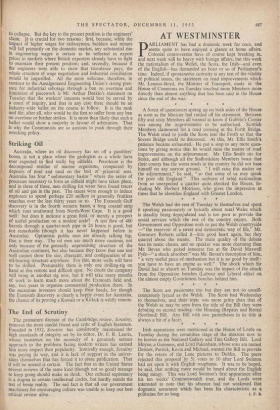Striking Oil
Australia, where an oil discovery has set off a gamblers' boom, is not a place where the geologists as a whole have ever expected to find really big oilfields. Petroleum is the decomposed residue of marine organisms, compacted by deposits of mud and sand on the bed of " primeval seas. Australia has four " sedimentary basins " where the series of processes necessary to form an oilfield might have taken place, and in three of these, men drilling for water have found traces of oil and gas in the past. The traces were enough to induce explorers to spend perhaps £20 million in generally fruitless searches over the last thirty years or so. The Exmouth Gulf discovery is in the fourth western basin, a long coastal strip which runs southward from North-West Cape. It is a good well : but does it indicate a great field, or merely a prospect of useful production on a modest. scale? A test flow of 480 barrels through a quarter-inch pipe in 24 hours is good, but not remarkable (though it has never happened before in Australia). Optimistic public men are already talking big; that is their way. The oil men are much more cautious, not only because of the generally unpromising structure of the Australian continent, but also because they know that one test well cannot show the size, character, and configuration of an oil-bearing structure anywhere. For this, more wells will have to be drilled. Presumably there is only one drilling-rig on hand at this remote and difficult spot. No doubt the company will bring in another rig now, but it will take many months of work to learn much more about the Exmouth field and, say, two years to organise commercial production there. In the meantime investors should keep their heads, for though the Exmouth discovery is clearly a happy event for Australia, the chance of its proving a Kuwait or a Kirkuk is wildly remote.


































 Previous page
Previous page